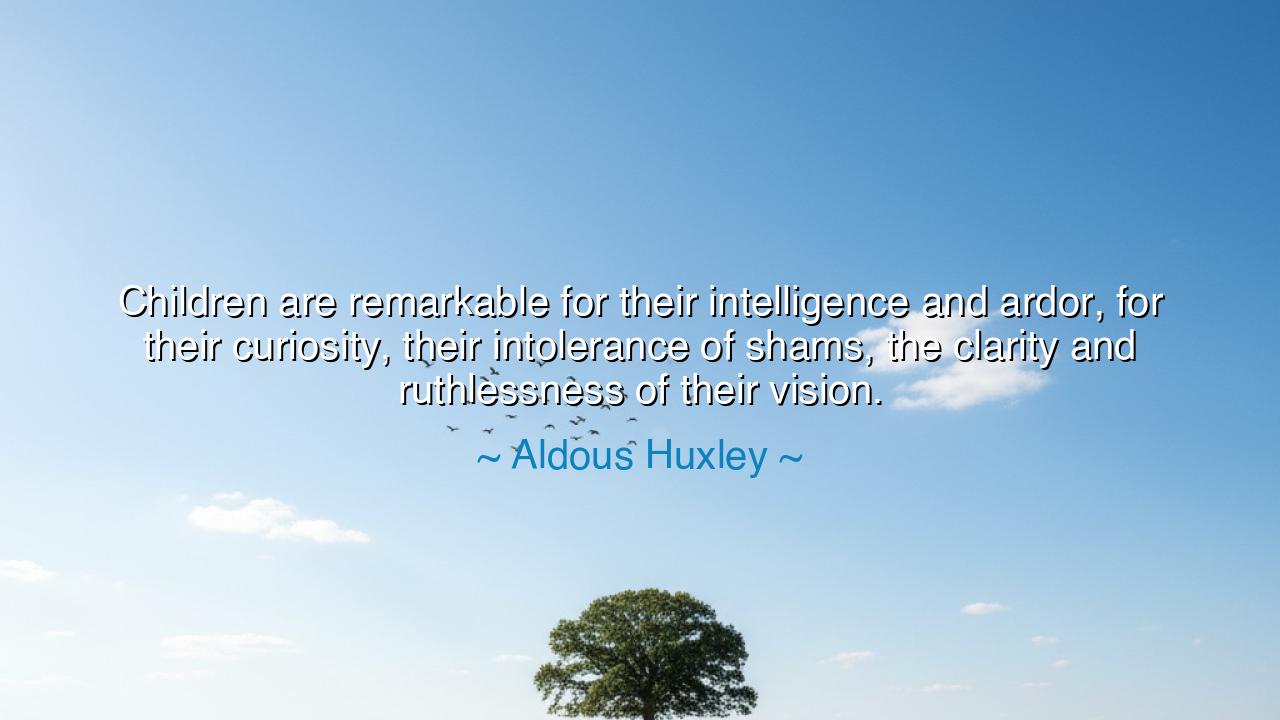
Children are remarkable for their intelligence and ardor, for
Children are remarkable for their intelligence and ardor, for their curiosity, their intolerance of shams, the clarity and ruthlessness of their vision.






The philosopher and novelist Aldous Huxley, a keen observer of the human soul, once declared: “Children are remarkable for their intelligence and ardor, for their curiosity, their intolerance of shams, the clarity and ruthlessness of their vision.” In this reflection, Huxley, whose mind spanned both the scientific and the mystical, speaks to the purity and power that dwell within the young. He reminds us that childhood is not a stage of ignorance, but a state of unclouded truth — an age when the spirit burns with curiosity, when sincerity is instinct, and when illusion has not yet learned to wear the mask of wisdom. His words are both admiration and warning: that as we grow older, we must strive not to lose the fierce light that once burned in us as children.
In the eyes of Huxley, the intelligence of children is not measured by knowledge, but by perception. They do not yet see through the distorted glass of prejudice or habit; they see directly, without filters. Their questions pierce to the heart of things. They ask why with holy impatience, unwilling to accept the hollow answers that adults have learned to repeat. Their minds are not cluttered by the debris of compromise. They see beauty and injustice alike with painful clarity, and they react with the full force of their ardor — that passionate energy that compels them to feel deeply, love fiercely, and reject falsehood instinctively.
This is what Huxley means when he speaks of their intolerance of shams. Children cannot abide hypocrisy. They sense deceit long before they can name it. They do not pretend politeness toward lies; they recoil from them, as a flame recoils from darkness. They demand authenticity, both from others and from life itself. As they grow, the world teaches them to soften this instinct, to tolerate falsehood as a form of courtesy, to accept the masks that adults wear. Yet Huxley, with his sharp eye for human corruption, warns that it is this very tolerance — the gradual numbing of our moral senses — that leads to mediocrity of soul. To live truthfully, we must remember how to see and feel as children do: directly, honestly, without disguise.
Consider the life of Helen Keller, who as a child was struck blind and deaf, cut off from the ordinary means of communication. Yet through the patient guidance of her teacher, Anne Sullivan, her inner curiosity and intelligence burst forth like light breaking through stone. Deprived of sight and sound, she perceived the world through touch, through thought, through imagination. Her hunger to understand life was insatiable, her spirit fierce. Even as a child, she refused pity or resignation. In her later years, she wrote that “the best and most beautiful things in the world cannot be seen or even touched — they must be felt with the heart.” Such was the clarity and ruthlessness of vision that Huxley spoke of — the vision not of the eyes, but of the soul.
The ruthlessness that Huxley attributes to children is not cruelty, but purity — the uncompromising truth of perception. A child looks upon the world without fear of judgment. If something is unjust, they name it so. If something is beautiful, they delight in it without calculation. There is no hypocrisy in their joy or their grief. This raw honesty, this refusal to bend truth to comfort, is both their gift and their peril. Adults often call it naivety, but in truth it is the seed of wisdom itself — for wisdom begins not in knowing many things, but in seeing one thing truly.
Huxley’s insight is also a lament, for he knew that this fierce clarity fades as we grow older. The world trains us to adapt, to conceal, to rationalize. We learn to survive by dimming the light of our perception, by wrapping our truth in layers of pretense. The child’s mind, once radiant with wonder, becomes clouded with cynicism. Yet the loss is not inevitable. The wisest among us — the artists, the prophets, the saints — are those who preserve the child’s vision, tempered by experience but never extinguished. They see the world as it is, and yet they continue to love it as it could be.
Let this be the lesson we draw from Huxley’s words: nurture the child within you, the one who still dares to question, to marvel, to believe. Guard that inner fire of curiosity and truth, for it is the compass of the soul. When faced with falsehood, reject it as a child would — with instinctive clarity. When confronted by wonder, embrace it without hesitation. In a world that rewards conformity, be as the child — unafraid to see clearly and to speak boldly.
And remember this truth: it is not knowledge that makes us wise, but vision; not experience that makes us pure, but sincerity. The child sees what is real because the child’s heart is free from deceit. Let us therefore live as those who still remember how to see — with the intelligence, ardor, and clarity that first greeted the world with open eyes and open soul. For in rediscovering the vision of the child, we rediscover the truth of what it means to be fully human.






AAdministratorAdministrator
Welcome, honored guests. Please leave a comment, we will respond soon